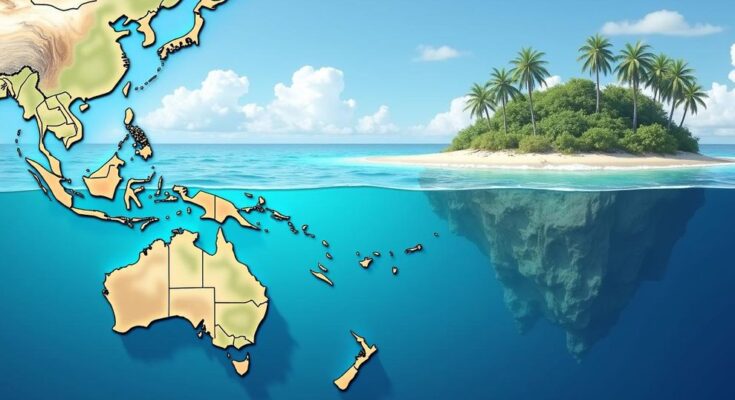United Nations Secretary-General Antonio Guterres has issued a dire warning about the accelerating crisis of rising sea levels, particularly affecting vulnerable Pacific Island nations. During his visit to the region, he emphasized the urgent need for global action to mitigate climate change effects that threaten the livelihoods and infrastructure of these communities. Reports indicate significant increases in sea levels in Pacific capitals, highlighting a humanitarian crisis that calls for support and accountability from wealthier nations responsible for emissions contributing to this alarming situation.
In recent remarks, United Nations Secretary-General Antonio Guterres highlighted the urgent crisis of rising sea levels, particularly affecting the vulnerable Pacific Island nations. During a visit to Samoa and Tonga, he reiterated a critical call for action, stating that this situation represents a significant threat to humanity’s future and accompanied his statements with alarming statistics regarding the increasing rates of sea level rise in these regions. The United Nations and the World Meteorological Organization released reports illustrating that the Southwestern Pacific is experiencing sea levels that have risen at alarming rates due to climate change driven by human activities, notably the warming of the planet and the melting of ice sheets and glaciers. Guterres underscored the unique challenges faced by Pacific nations, which are compounded by issues such as ocean acidification and marine heat waves that threaten marine ecosystems and the communities that rely on them. At a gathering of the Pacific Islands Forum in Tonga’s capital, Guterres pronounced this crisis as one of humanity’s own making, declaring, “This is a crazy situation. Rising seas are a crisis entirely of humanity’s making. A crisis that will soon swell to an almost unimaginable scale, with no lifeboat to take us back to safety.” A report commissioned to assess the impact of rising seas on different Pacific nation capitals revealed significant increases in sea levels: Nuku’alofa, Tonga saw a rise of 21 centimeters from 1990 to 2020, and other capitals experienced similarly alarming increases. As Guterres noted, roughly 90% of the residents of these island nations reside within a mere five kilometers of the coast, rendering them particularly susceptible to flooding and environmental catastrophe. The frequency of coastal flooding events has dramatically increased in regions such as Guam and the Cook Islands, accentuating the severe risk posed by rising seas. Celeste Saulo, the secretary-general of the World Meteorological Organization, echoed these warnings, commenting, “Because of sea level rise, the ocean is transforming from being a lifelong friend into a growing threat.” The alarming rise in sea levels is primarily attributed to the accelerated melting of the ice sheets in Greenland and Antarctica, with the Pacific islands experiencing impacts despite contributing minimally to global greenhouse gas emissions. Experts suggest that about 90% of the heat trapped by climate change has been absorbed by the oceans, which exacerbates the sea level issue. Additionally, the UN reported that global sea levels are elevating at the fastest rate seen in 3,000 years, emphasizing a growing trend from 1.3 centimeters per decade in the early 20th century to 4.8 centimeters in recent years. Multi-national cities, particularly in wealthier nations, are also experiencing rapid increases in sea levels, which threaten their infrastructure and populations. Guterres called upon developed nations to do more in reducing carbon emissions and supporting vulnerable countries. He aspires for Pacific nations to articulate their plights and advocate for responsibility from those contributing significantly to climate change at the upcoming United Nations General Assembly.
The article addresses the critical issue of rising sea levels, particularly as it affects Pacific Island nations, which are considered some of the most vulnerable communities to climate change. Secretary-General Antonio Guterres has positioned this topic prominently, linking it to broader efforts to combat climate change and calling attention to the humanitarian implications of inaction. The rising sea levels are a result of climate change exacerbated by significant human activity, and they pose existential threats to low-lying island nations, which already face increasing instances of flooding and environmental degradation.
In conclusion, the situation regarding rising sea levels, as presented by Secretary-General Guterres, demands immediate and concerted global action. The alarming statistics presented highlight that the Pacific Island nations are at the forefront of the climate crisis, experiencing severe losses and threats to their habitats and livelihoods. Despite their minimal contribution to global greenhouse gas emissions, these nations are disproportionately impacted by a crisis of human creation, urging wealthier nations to acknowledge their responsibilities and implement solutions that mitigate this ongoing catastrophe. The anticipated discussions at the upcoming United Nations General Assembly may provide a platform for enacting necessary changes to address this urgent global issue.
Original Source: www.voanews.com




